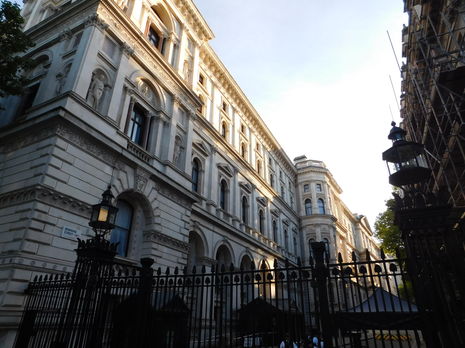The government’s empty rhetoric against Ratcliffe’s grim reality
As Richard Ratcliffe enters the seventeenth day of his hunger strike, Senior Opinion Editor Olivia Young argues that the government have continued to fail Nazanin Zaghari-Ratcliffe and her family

Hunger strikes are not a new form of political protest, but this protest has a key difference from the past. For others like Emmeline Pankhurst or Mahatma Gandhi, their hunger strikes were to raise attention for their cause to public officials. For Ratcliffe, however, the story couldn’t be more different: the government have already accepted that they need to act, but the problem is that they haven’t. Visits from Claudia Winkleman, Cambridge MP Daniel Zeichner, or even Labour leader Keir Starmer may be a good photo opportunity – but how far will they actually go in closing the accountability gap of the government?
Ratcliffe argues that the government is clear on what needs to happen: the £400 million debt that the UK acknowledges it owes Iran from 1979 must be paid. In 2008, international courts ruled that the UK did owe the debt from un-delivered tanks, and the UK government has indeed indicated that they are willing to pay it. Ratcliffe is arguing that his wife is essentially being held as ransom for this debt – and the governments empty promises to repay it is behind her five year and ongoing detainment by the Iranian government. From a journalist to a diplomatic pawn, the situation surrounding Nazanin Zaghari-Ratcliffe’s has become increasingly beyond belief.
The government’s apprehension in moving from rhetoric to reality may be a common observation in the last few decades, but i it’s too easy to forget that inaction can have the same human cost as a misguided action. The longer inaction continues, the more political prisoners and their loved ones will needlessly suffer.
“It’s too easy to forget that inaction can have the same human cost as a misguided action”
Every day after school, their seven-year-old daughter joins her father in the cold and often rain-soaked camping chairs outside the Foreign Office. Committed as he is to his hunger strike, Ratcliffe insists he will not let his “my daughter, Gabriella go from two parents to none. [He has] no death wish”. Nevertheless, concerns for his wellbeing are increasing as he enters day seventeen of his hunger strike. Well wishing strangers send their kindness, and even Amazon packages to the FCDO, but this is no substitute to sustenance. Ratcliffe admits that “each day now feels like a descent” – and coupled with a “strange desire for scrambled egg on toast”, every day of Richard’s suffering reminds us of the government’s failure to protect its citizens.
“After all, what does it mean to have a British passport if your government treats you as collateral damage?”
Ratcliffe vows that he and his wife will be united in their goals and united in their suffering for as long as it takes for her to stop being seen as political leverage. After all, what does it mean to have a British passport if your government treats you as collateral damage? Whether it’s blue or black, surely if British passports mean free movement, this should include your passage back home to your family. The family of Zaghari-Ratcliffe can only hope, and the government seemingly can only disappoint.
 News / Cambridge study finds students learn better with notes than AI13 December 2025
News / Cambridge study finds students learn better with notes than AI13 December 2025 News / Cambridge Vet School gets lifeline year to stay accredited28 November 2025
News / Cambridge Vet School gets lifeline year to stay accredited28 November 2025 Science / Did your ex trip on King’s Parade? The science behind the ‘ick’12 December 2025
Science / Did your ex trip on King’s Parade? The science behind the ‘ick’12 December 2025 News / Uni Scout and Guide Club affirms trans inclusion 12 December 2025
News / Uni Scout and Guide Club affirms trans inclusion 12 December 2025 Arts / Modern Modernist Centenary: T. S. Eliot13 December 2025
Arts / Modern Modernist Centenary: T. S. Eliot13 December 2025







